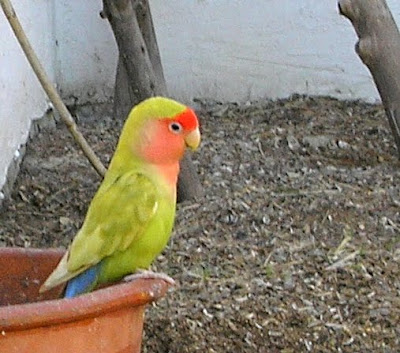 Having to eat every two hours he came everywhere with me and was quite popular. As he grew the gullet that used to fill up with food and look so ugly, began to disappear and his feathers began to grow. Pipsqueak, as we called him, turned into a beautiful yellow bird with blue tail feathers. He lived free in our bedroom and sat on my shoulder every morning to make coffee. The aviary runs the full length of one side of the house so you can watch the birds from several rooms. It was better than Dallas, the mothers teaching the babies to fly, the building of nests, the fight for residential counsel-flats or flower-pots and especially the flirting. Love Birds are monogamous and will even pine to death if they lose a mate. Both parents take part in the raising of the young and look like hedgehogs when they fill their feathers with bits of palm leaves to build the nest.
Having to eat every two hours he came everywhere with me and was quite popular. As he grew the gullet that used to fill up with food and look so ugly, began to disappear and his feathers began to grow. Pipsqueak, as we called him, turned into a beautiful yellow bird with blue tail feathers. He lived free in our bedroom and sat on my shoulder every morning to make coffee. The aviary runs the full length of one side of the house so you can watch the birds from several rooms. It was better than Dallas, the mothers teaching the babies to fly, the building of nests, the fight for residential counsel-flats or flower-pots and especially the flirting. Love Birds are monogamous and will even pine to death if they lose a mate. Both parents take part in the raising of the young and look like hedgehogs when they fill their feathers with bits of palm leaves to build the nest.Every once in a while I would take Pipsqueak out to the aviary to meet some of his own kind but he always flew straight back to me, not wanting to have anything to do with the other birds. After two years of constant companionship, I put him in the window to chat with the others, when his behaviour became very agitated. He kept squeaking and flying back and forth to the window then my shoulder. I took him inside the aviary where he promptly left me and joined a blue Love Bird. Pipsqueak never came back to sit on my shoulder or come in the house. After a while I could't even tell him from the other yellow ones. With my feelings very hurt I asked my father why he thought that he wouldn't even come see me inside the aviary. As always with my father's quick wit, he said "well if your mother looked like that would you want to introduce her to your friends?" He didn't mean it in a hurtful way he just meant that with me being so big and of another species I was quite a spectacle. By the way it turned out Pipsqueak was a girl and had batches of green and red Love Birds.


 These are the new shoots on a burned eucalyptus one month after the Mojácar fire (which burned several thousand acres, including most of our land). For one month there were no mosquitos or flies or fleas to bite us. Sadly we lost a lot of the more attractive local wildlife like the hares, wild tortoises (tortuga mora) and the local lizards. We saw frightened birds flying off with their wings on fire. We hope that the swifts who nested under our beams managed to fly to safety. We were visited by a few of them in the following days, but they should be in Africa by now.
These are the new shoots on a burned eucalyptus one month after the Mojácar fire (which burned several thousand acres, including most of our land). For one month there were no mosquitos or flies or fleas to bite us. Sadly we lost a lot of the more attractive local wildlife like the hares, wild tortoises (tortuga mora) and the local lizards. We saw frightened birds flying off with their wings on fire. We hope that the swifts who nested under our beams managed to fly to safety. We were visited by a few of them in the following days, but they should be in Africa by now.

